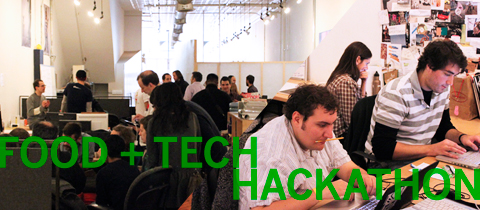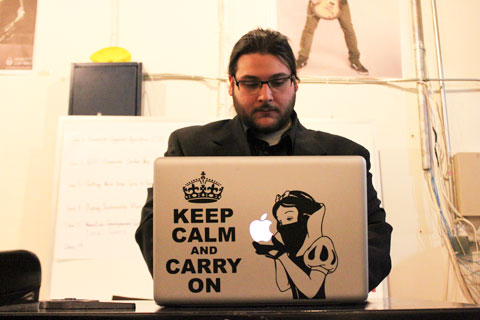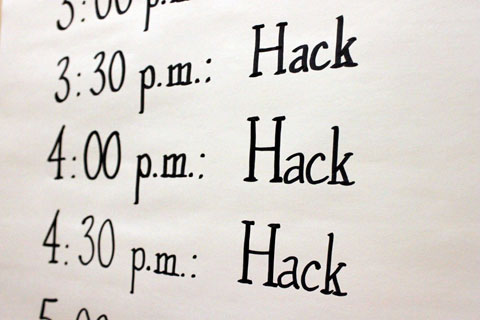
It was 8:00 a.m. on a Saturday morning in Soho, the streets lay quiet and Broadway was not yet filled with shopping tourists. Though one floor above, at co-working space Soho Haven, there was a bustle of energy as developers, designers, statisticians, urban farmers, public officials, and researchers from across the city gathered for the first-ever Food + Tech Hackathon.
The December 4th event was part of the International Open Data Hackathon (other events in NYC were held at the New York Times and the United Nations), and was arranged by Danielle Gould from Food + Tech Connect, Marc Alt from Open Source Cities and Tian He from Gojee (a startup whose offices are at Soho Haven).

Dominic DiFranzo from RPI's Tetherless World Constellation Lab, who kicked off the day with a lecture on Open Data and the Semantic Web.
Lots of coffee was consumed during the day, which began with a lecture on Open Data and the Semantic Web by Dominic DiFranzo of Rensselaer Polytechnic Institute (RPI). DiFranzo is a Ph.D. candidate in Computer Science at RPI’s Tetherless World Constellation Lab, his current research is in the Linking Open Government Data project, where he has helped build a community portal to bring Semantic Web technologies to open government data. The concept of Semantic Web is basically trying to make computers understand information more like humans do, so that they can independently make sense of data — finding, understanding, and putting information in context — without human guidance. Not unlike the intelligent supercomputers that have taken over the world in many sci-fi movies over the years. People like DiFranzo and the participants and the Food + Tech Hackathon are, however, looking to use the Semantic Web for social good, to help make sense of the massive amounts of data just made available by the U.S. Government.

Idea-mapping
Attendees were encouraged to submit ideas to a wiki beforehand, and were then divided into groups based on their interests. A few more ideas emerged that morning and in the end there were thirteen groups working on everything from a CSA Finder/Generator and a searchable NYC Garden Map to group buying of meat and a Foodie Toolbar for the Chrome browser.

DiFranzo sharing some of his wisdom with the hackers.
Here is a short description of each project, you can learn more about them — and how you can help, if you may wish to do so — on the wiki.
CSA Finder
Neighborhood CSA (Community Supported Agriculture) groups are run by members. A rotating core group of volunteers take on much of the administrative management of the CSA. This can include signing up new members, collecting members payments, running the distribution site, and planning community-building or educational events. We want to create open software that can simplify, automate, and scale these tasks so we can lower the barrier to entry for starting and managing CSA initiatives in as many buildings as possible.
NYC Community Garden Map
There is no single place to get information about community gardens in NYC besides oasisnyc.net, which only lets viewers see info about one garden at a time. Community gardens have countless benefits for the environment, public health, food security, education, etc., yet maintain barriers to entry and remain without long-term/permanent land tenure, partially because these benefits have never been fully documented and available to the public. We want to create an interactive web map that lets users search through existing data on community gardens, query for details such as “gardens that partner with schools,” “gardens in Community Board X that grow okra,” etc. There could be info on trainings, workdays, funding and other resources gardeners need as well.gardenmaps.org
Getting Meat from Farm to your Table
The Idea is to brainstorm a software system for individuals to come together and collectively buy whole animals direct from farmers, as well as tools for farmers to manage herds and slaughtering schedules to accommodate these buyers. groupme.at (mobile site)
Buying sustainably wherever you are
People want to buy good food from good companies, but don’t know who does what. We want to create a free Android/Iphone app that lets people see sustainability ratings for food products. We could use a pre-made barcode scanner and consider including other data resources (both open and closed-sourced data, such as USDA and Eat Well Guide) to make portable, light-weight smart-phone browsing that lets people gain access to sustainability options for food products. The team on this project ended up creating an app called Farmsquare (anyone familiar with Foursquare will get the idea), where you can check in at your local farmers market and check the items that you buy.
Foodie Toolbar
We’d like to make the online experience for people interested in food a bit more than searching for recipes. The solution would be a chrome extension that would help users quickly access important information about a recipe when they visit recipe sites (e.g. nutritional information). We’re also going to highlight what the approximate cost of cooking that dish would be and anything else that would be useful in helping users transition from looking at a recipe to making it all using readily accessible open data.
The 21st Century Community Kitchens project attracted the largest group of collaborators.
The 21st Century Community Kitchens Project
Twenty-first century community kitchens will be fully licensed, shared-use, community-scale, health- and sustainability-oriented facilities where delicious, cost-competitive, value-added (processed) foods are brought to market by a diverse food entrepreneurs. In distinction to the anonymity that routinely encloses industrially sourced food, the goal of value-added food production in a 21st century community kitchen is full transparency—what the ingredients are, where they come from (in as much detail as possible), their nutritional value, the conditions under which the growers labored, animal welfare, the environmental impacts of production sans externalization of sundry “life-cycle” costs. The 21CCK Project is another fundamental, bottom-up response to many of the same systemic challenges that are inspiring the re-localization/re-regionalization of our sources of fresh produce. Imagine living in a society that actively encouraged the production and consumption of this kind of processed foods.
Coworking + CSA Partnership Facilitation Coworking spaces and startup business incubators are sprouting up around the world probably as quickly as CSAs. Both entities provide services to ‘members’ and both need what the other has. Coworkers need food and access to rural spaces. CSAs need customers and access to urban talent. It’s a natural partnership. A bunch of spaces are teaming up together to create a database/api for the coworking/hackerspaces around the world. Maybe we could figure out what functionality would be necessary for the inclusion of farms and CSAs? We could also design a learning module/package that promotes CSAs to a coworkers.coworkingregistry.org
Local Food Finder
Food entrepreneurs of all kinds are starting new small businesses and launching new food products here in NYC and everywhere beyond. They have limited budgets for promotion, marketing, transportation – and it can be hard for their customers to find where their products are being sold, or to know when their products are back in stock again. Burgeoning bakers, mustard makers, and picklers want to sell you their cookies and wares, and Local Food Finder is the way to let everyone know what’s up. Basically, it’s Beer Menus for local, artisanal, entrepreneurial food products. wemakefood.com (not yet live)
GroceryHop
Creating a shopping list for your favorite grocery store, then comparing cost and availability to that of a nearby farmers market. The idea is to shift thinking about farmer’s market produce and goods away from being considered specialty items and instead make them standard, accessible and viable substitutes for shopping list staples.hoppinglist.appspot.com
Operating Cost for For Milk Producers in the US from Drew Conway on Vimeo.
Milkhack — determining data quality
Attempting to find, curate and present food related data. At present, this includes milk, fruit and vegetables. The USDA provides aggregate data about farming; such as, production volumes, consumption trends, and costs. A video (see above) was created which used this aggregate data to illustrate how the operating costs for milk producers vary regionally over time. milkhack.com

The group working on Cravin' It, a search tool that will enable you to search by menu item, not just type of cuisine.
Cravin’ It — Menu Item Finder
A service to help you find what you want to eat. This web application scrapes data from local restaurant menus and parses menu items into categories using ingredient keywords. A sample query could include “grass fed beef” which would return single menu listings from area restaurants. The idea behind Cravin’ It is to make menus more accessible and transparent, and to answer your cravings in an effective way using search, natural language processing and semantic web linked data.
All this was done in one day, imagine if we did this for a week, or maybe once a week for three months? Great things come to those who focus. Keep a lookout on the wiki for developments and future foodie hackathon events.
All photos by Johanna Björk. See more photos from the event on Flickr.
This was originally posted at http://www.goodlifer.com
Born in a smallish Swedish town, Johanna moved across the pond in the first year of the new millennium, spent seven years in Miami, and then settled in Brooklyn, NY. A graphic designer by trade, her career has followed a windy road through real estate marketing, art fair parties, neighborhood branding, magazine design, fashion styling, travel writing, sports and entertainment marketing, and non-profit organizations. She realized what bound all these experiences together was a desire to tell stories, and decided to start Goodlifer as a way of expressing this passion, with words as well as visuals. Fed up with negative doom and gloom prophecies, she wanted to offer a positive outlook for the future, and sees Goodlifer as a place for like-minded people to come together and share great discoveries, thoughts, tips and reflections on a new definition of the Good Life. We’re all in this world together, let’s make sure we have a good time!
Johanna has a day job as an Art Director in Corporate America, enjoys riding the subway because it offers opportunity for undisturbed reading, always falls asleep when watching TV, and thinks everything is just a tad bit better with champagne.
johanna [at] goodlifer.com






